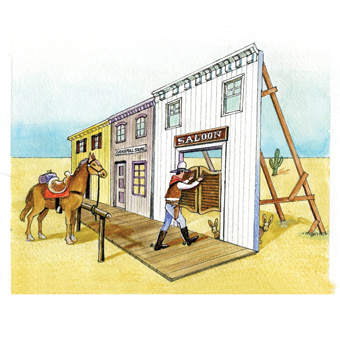It may take true grit to avenge a murder, but the gritty truth is that revenge only works in the movies.
I grew up watching Westerns like other boomers, so when critics praised Joel and Ethan Coen’s remake of True Grit as a splendid classic Western à la John Ford, I decided to treat myself to the guilty pleasure of an old-fashioned sagebrush saga.
And it would be tough not to enjoy this new rendition of Charles Portis’ 1969 Western about an avenging orphan seeking biblical justice for her slain father. From the first scene cinematographer Roger Deakins immerses us in the rugged, gorgeous, dangerous, and strangely romantic world of the classic Western. The Coen brothers populate this barbarous and mythic world with a chorus of greedy shopkeepers, rough lawmen, murderous villains, and a young heroine with a mountain of grit. They give their characters sharp, funny, and often moving lines in a tale with a kick like a Remington.
Mattie Ross (Hailee Steinfeld), 14, is neither cute nor sweet, but she is hell-bent on avenging Tom Chaney’s senseless murder of her father. She hires Rooster Cogburn (Jeff Bridges), the most ruthless, seedy, and drunken U.S. Marshal she can find to take her into lawless Indian country to track down and capture the vile Chaney (Josh Brolin).
Along the way they join forces with a vain sharpshooting Texas Ranger named LeBoeuf (Matt Damon, also on Chaney’s trail), and this unholy trio hunts, quarrels, and slaughters their way across the frightening badlands, stumbling at long last onto their prey.
In the ensuing battle Cogburn and LeBoeuf prove their mettle by slaying the murderous gang Chaney has joined, and Mattie faces down her father’s killer. It is a gunfight meant to satisfy Mattie and the audience’s thirst for a bloody sort of justice.
But as splendid as this version of True Grit is (and I liked it better than the 1969 John Wayne film), I wouldn’t call the Coen brothers’ film a “classic” Western. More like half of a classic.
The golden age of Hollywood Westerns was also the golden age of American postwar imperialism. The United States was flexing its neocolonial muscles as a military and economic superpower engaged in a global crusade against communism.
In those Cold War decades when the United States increasingly saw itself as the world’s cop and democracy’s sole defender, Hollywood Westerns about gun-toting sheriffs and cavalry soldiers bringing law and order to the wilderness supported the myth of American imperialism.
In hundreds of Westerns made in the ’40s, ’50s, and ’60s, Hollywood’s sanitized and often racist version of how the West was won echoed Cold War myths justifying armed invasions of dozens of countries. John Ford’s cavalry officers “tamed” the West by conquering native “hostiles” in the same way American troops “liberated” Third World nations by defeating guerilla insurgents. And the heroes of Shane (1953) and The Magnificent Seven (1960) vanquished lawlessness with a six gun just as America overcame Soviet aggression with our nuclear arsenal. Westerns were the fables Hollywood told us to justify the Cold War myth.
By the mid-’60s, however, the myth was fraying at the edges. It was hard to believe in American imperialism while watching the Vietnam War on the evening news, making it tougher to watch TV Westerns telling racist and imperial fables.
At the movies Westerns turned dark and cynical. Cavalry soldiers became marauding thieves in The Wild Bunch (1969), and cowboys turned into train robbers in Butch Cassidy and the Sundance Kid (1969). By the early ’70s Westerns had virtually disappeared from TV.
Still, they hung on at the box office. Clint Eastwood took up John Ford’s and John Wayne’s mantle, producing a trickle of serious Westerns in the ’70s, ’80s, and ’90s. These cowboy stories were stripped of imperial pretensions, making no effort to justify the conquest or colonization of the West or to portray Native Americans as savages.
Nonetheless, these films clung to the other half of the “classic” Western—the law of vengeance. In classic Westerns men with guns enforced justice by taking the law into their own hands, avenging an eye for an eye and a life for a life. This lex talionis was “the code of the West” and the central lesson of Stagecoach (1966), Shane, and The Gunfight at the OK Corral (1957). And it remained the lesson of most recent Westerns.
As the Cold War was replaced by America’s ongoing wars on crime and drugs, Hollywood embraced the armed vigilante as a heroic icon. Eastwood played a vigilante cop in the Dirty Harry movies and vigilante cowboys in Hang ’Em High (1968), High Plains Drifter (1973), and Pale Rider (1985). The post-colonial Western had lost its taste for empire, but not for vengeance.
But by the mid ’90s Americans began to tire of endless and futile wars on crime and drugs, and Eastwood’s last (and best) Western, Unforgiven (1992), takes a hard, unflattering look at the avenging gunslinger, a venal, brutal killer with few moral aspirations. The “code of the West” was but a sham. Violence is not redemptive. It only litters the landscape with widows and orphans.
And yet the classic Western lingers. After 9/11 Washington resurrected the genre. Our cowboy president and nation set out to tame the world’s badlands, vanquish its hostiles, and avenge its victims. A decade into the folly, Hollywood offers us a splendid “classic” Western extolling the virtues of redemptive violence. Mattie Ross has no racist or imperial designs, but she will have her pound of flesh.
Fourteen-year-old Mattie may still be young enough to believe in redemptive violence and the “code of the West.” She may think vengeance is sweet and just. But after a half century of wars on communism, crime, drugs, and terror, this ol’ cowboy has his doubts.
This article appeared in the March 2011 issue of U.S. Catholic (Vol. 76, No. 3, pages 41-42).
Image: William Petersen















Add comment